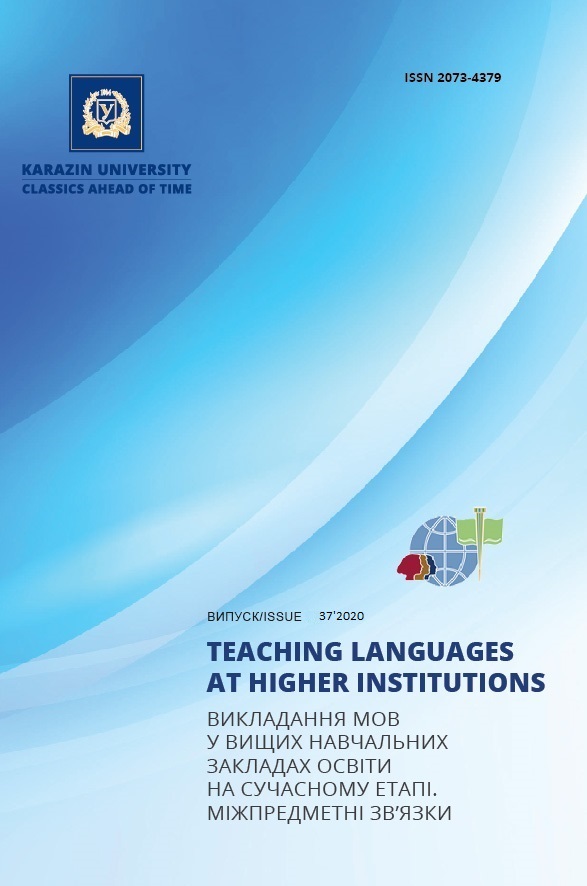Synthesis of modern methods of foreign language teaching as an activation means of cognitive activity of higher education students
Abstract
The relevance of this article is determined by the need to overcome the contradictions between the existing system of professional training in higher education and the requirements of society for qualified professionals capable of self-education and self-improvement throughout their lives.
The purpose of the article is a theoretical substantiation of the use of the synthesis of English teaching methods, which are implemented in practice and which are aimed at activating the cognitive activity of arts students in higher educational institutions.
In the teaching of certain disciplines in higher education institutions, teaching methods are used to activate the cognitive activity of students. From the point of view of teaching humanities, methods of programmed, problem-based, and interactive (communicative) teaching are used to control the formation of students’ thinking.
The use of programmed learning is based on the idea of two-part learning activities: instructive and executive. Problems in the learning process involve a special organization of the acquired knowledge content when it is provided to students, not in the complete form, but as the desired unknown being part of the problem task (questions, tasks, situations), the intellectual activity of the student in search of this content constitutes the process of its assimilation.
In the course of teaching the disciplines of the humanities, in particular foreign language teaching, methods of interactive (communicative) learning are considered as the main ones. Stimulation of cognitive activity occurs in the process of discussing certain issues and problems of educational material, when the teacher, on a par with students, participates in joint productive educational activities, in contrast to the interaction of two activities – educational and training.
The results of the student survey showed that the use of the synthesis of the proposed methods of teaching a foreign language is one of the leading conditions for the formation of educational and cognitive motives in students of humanities. Activation of personality motivational components during the organization of educational activities takes place through the creation of conditions that provide a subjective position of students at each stage of the lesson.
Downloads
References
Buzko, V.L. and Ivanytska, N.A. (2015). Prohramovane navchannya yak osnova dystantsiynoyi osvity v zahalnoosvitniy shkoli [Programmed learning as the basis for distance education in secondary school]. Visnyk Chernihivskoho natsionalnoho pedahohichnoho universytetu. Seriya: Pedahohichni nauky [Bulletin of Chernihiv National Pedagogical University. Series: Pedagogical sciences], 127, pp. 12–15 [in Ukrainian].
Galperin, P.Ja. (1965). O psihologicheskih osnovah programmirovannogo obuchenija [On the psychological foundations of programmed learning]. Novye issledovanija v pedagogicheskih naukah [New research in educational sciences], Issue ІV. Moscow: Progress [in Russian]
Gebos, A.I. (1986). Psihologija svojstv lichnosti [Psychology of personality traits]. Kishinev: Lumina [in Russian].
Herlun, N. (2006). Problemne navchannya yak zasib formuvannya piznavalnykh tvorchykh zdibnostey uchniv [Problem-based learning as a means of forming students’ cognitive creative abilities]. Dyrektor shkoly [School Director], 27, pp. 33–38 [in Ukrainian].
Dajri, N.G. (1984). Glavnoe usvoit na uroke [The main thing to be learnt at the lesson]. Moscow: Znanie [in Russian].
Zakon Ukrayiny “Pro vyshhu osvitu” [Law of Ukraine “On Higher Education”]. (2014). Vidomosti Verxovnoyi Rady [Verkhovna Rada bulletin]. 2014, 37–38, art. 2004. URL: https://zakon.rada.gov.ua/ laws/show/1556-18 [Accessed 17 July 2020] [in Ukrainian].
Zakon Ukrayiny “Pro osvitu” [Law of Ukraine “On Education”]. (2017). Vidomosti Verxovnoyi Rady [Verkhovna Rada bulletin]. 2017, 38–39, art. 380. URL: https: //zakon.rada.gov.ua/laws/show/2145-19 [Accessed 17 July 2020] [in Ukrainian].
Lerner, I.Ja. (1981). Didakticheskaja osnova metodov obuchenija [Didactic basis of teaching methods]. Moscow: Pedagogika [in Russian].
Markova, A.K., Orlov, A.B. and Matis, T.A. (1990). Formirovanie motivacii uchenija [Formation of learning motivation]. Moscow: Prosveshhenie [in Russian].
Matjushin, A.M. (1972). Problemnye situacii v myshlenii i obuchenii [Problematic situations in thinking and learning]. Moscow: Nauka [in Russian].
Talyzina, V.P. (1985). Teoreticheskie osnovy razrabotki modeli specialista [Theoretical foundations of specialist model development]. Moscow: Znanie [in Russian]
Ljaudis, V.Ja. (Ed.). (1989). Formirovanie uchebnoj dejatelnosti studentov [Formation of educational activity of students]. Moscow: MGU [in Russian].
Khomyak, I. (2010). Prohramovane navchannya [Programmed learning]. Visnyk Lvivskoho universytetu. Seriya: Filolohiya [Bulletin of Lviv University. Series: Philology], 50, pp. 135–143 [in Ukrainian].
Hruckij, E.A. (1991) Organizacija i provedenie delovyh igr [Organization and carrying out of business games]. Moscow: Pedagogika [in Russian].
Jagupov, V.V. (2002). Pedagogіka [Pedagogy]. Kyiv: Libіd [in Ukrainian].
Yurovchyk, V.H. (2016). Problemne navchannya yak metod orhanizatsiyi navchalnoyi diyalnosti uchniv [Problem-based learning as a method of organizing students’ learning activities]. Pedahohichnyy poshuk [Pedagogical search], 3 (91), pp. 28–29 [in Ukrainian].
Skinner, B.F. (1938). The behaviour of organisms. An experimental approach. New York, pp. 43–54 [in English].

